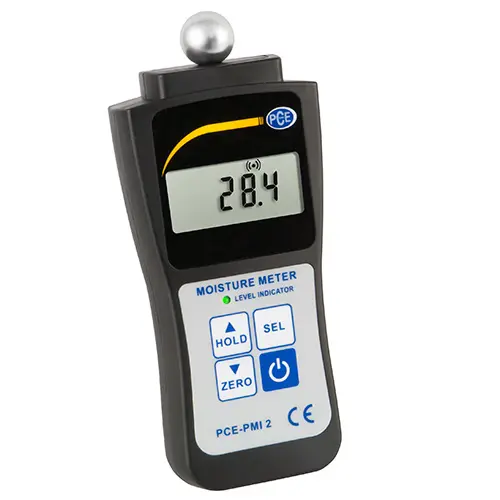Top 10 Advantages of Using a Moisture Meter for Exact Measurements in your house
Top 10 Advantages of Using a Moisture Meter for Exact Measurements in your house
Blog Article
The Ultimate Guide to Dampness Meters: A Comprehensive Overview and Exactly How They Can Save You Cash
In the realm of building upkeep, building, and different industries, the importance of precisely measuring wetness levels can not be overemphasized. Wetness meters offer as vital devices in discovering and keeping track of moisture material in products, assisting in protecting against expensive damages and making sure the high quality of products. Understanding the nuances of various types of moisture meters, their applications, and the potential cost-saving benefits they offer can be a game-changer for businesses and professionals alike. Uncovering just how these devices can not just simplify processes however additionally add to monetary savings is a journey worth beginning on.
Sorts Of Wetness Meters
Numerous kinds of dampness meters are readily available for different applications in different industries. One typical type is the pin-type moisture meter, which measures the electric resistance between two pins inserted into a material. This type is ideal for wood, drywall, and various other building products. Pinless moisture meters, on the other hand, use electro-magnetic sensing unit plates to check a bigger area without creating damages to the material's surface. Moisture Meter. These meters are ideal for promptly examining wetness degrees in huge locations such as wall surfaces and floorings.

Infrared wetness meters determine the thermal residential properties of a product to establish its dampness material non-invasively, making them helpful for applications where pin or pinless meters may not be suitable. Understanding the different types of dampness meters offered can aid markets pick the most appropriate device for their certain dampness dimension requirements.

Benefits of Making Use Of Dampness Meters
Moisture meters use very useful advantages in precisely keeping an eye on and assessing moisture degrees in varied materials and settings (Moisture Meter). Among the primary advantages of utilizing dampness meters is the avoidance of possible damages triggered by excess moisture. By detecting and dealing with high dampness degrees at an early stage, moisture meters aid to avoid mold and mildew development, rot, and architectural damages in structures, conserving both money and time on repairs. In addition, dampness meters aid in making certain the quality of materials throughout building and construction or production processes. By precisely measuring dampness content, these devices help keep the stability of timber, drywall, concrete, and various other products, minimizing the threat of defects or failings.
Furthermore, using dampness meters can bring about enhanced energy efficiency. By recognizing locations with high moisture degrees, such as leaks or bad insulation, adjustments can be made to improve power conservation and decrease energy prices. In agricultural settings, dampness meters play a crucial duty in maximizing plant yields by making it possible for farmers to keep an eye on dirt dampness levels and make educated watering decisions. Overall, the advantages of making use of moisture meters cover across numerous industries, supplying cost-effective remedies and promoting better quality assurance practices.
Exactly How to Choose the Right Dampness Meter
When picking a dampness meter, it's essential to ensure that the meter is ideal for the particular material you will be screening. Different materials have varying electric residential or commercial properties that can influence moisture analyses, so choosing a meter designed for your material is critical for precise results. By meticulously reviewing these factors, you can select a dampness meter that meets your demands and supplies accurate moisture measurements for your jobs.
Appropriate Strategies for Wetness Meter Usage

Expense Cost Savings With Dampness Meter Applications
Just how can the tactical usage of wetness meters lead to substantial price savings throughout different sectors? In the agriculture industry, moisture meters aid in determining the ideal time for collecting plants, protecting against excess or over-drying dampness that can affect the final product's high quality.
Likewise, in building and construction, wetness meters help prevent expensive problems by detecting moisture degrees in building materials, such as timber or concrete, which can bring about architectural problems if not addressed without delay. By determining trouble locations beforehand, service providers can take rehabilitative actions to prevent substantial fixings or replacements, ultimately conserving money and time.
Additionally, in the food processing industry, dampness meters are necessary for monitoring item quality and making certain conformity with safety and security laws. By accurately why not try here measuring moisture material in foodstuff, suppliers can avoid wasting, keep quality, and decrease waste, resulting in significant cost savings. Generally, the strategic application of moisture meters is a valuable financial investment that can result in substantial price reductions and improved performance across different industries.
Final Thought
In conclusion, moisture meters are beneficial tools for determining and detecting wetness degrees in numerous materials. By utilizing the right wetness meter and complying with correct strategies, individuals can properly avoid expensive problems triggered by excess dampness.
Moisture meters serve as essential devices in identifying and monitoring moisture content in products, helping in preventing costly problems and look these up making sure the high quality of items. Infrared dampness meters measure the thermal residential or commercial properties of a product to determine its dampness material non-invasively, making them beneficial for applications where pin or pinless meters might not be ideal.Dampness meters use indispensable benefits in properly monitoring and analyzing wetness levels in varied products and atmospheres. In farming settings, moisture meters play a vital role in optimizing plant yields by allowing farmers to keep track of dirt wetness degrees and make educated watering choices.In conclusion, wetness meters are valuable devices for finding and measuring moisture degrees in numerous products.
Report this page